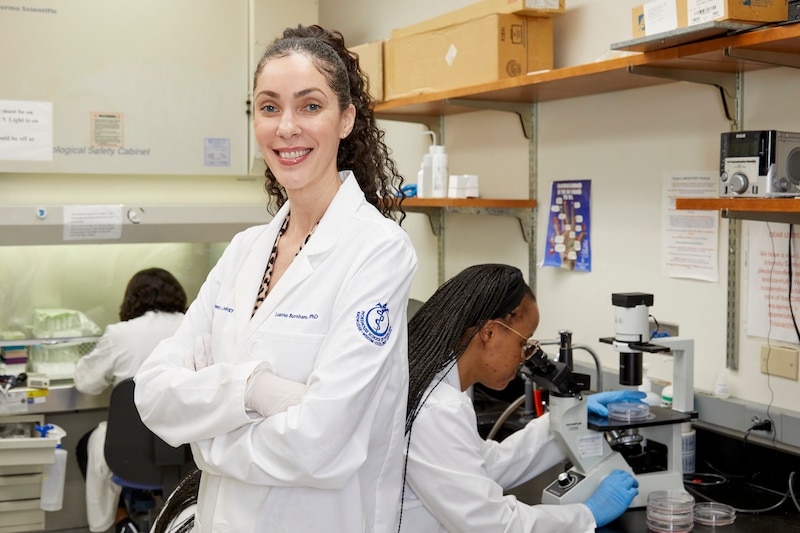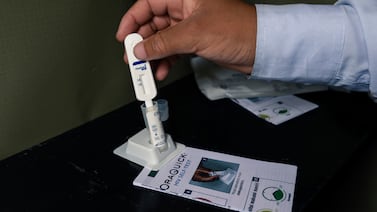Public health, explained: Sign up to receive Healthbeat’s free Atlanta newsletter here.
Leanne Woods-Burnham is a top prostate cancer researcher.
But being a top researcher doesn’t guarantee your relatives get the best care.
Burnham’s husband struggled to persuade a doctor to run a common prostate cancer screening test, even though he was over 40, Black, and had several relatives who had been diagnosed with advanced cancer.
“It was like pulling teeth,” Burnham said. It was especially concerning because Black men have a much higher rate of death from prostate cancer than white men. When caught early, prostate cancer is curable.
Burnham, an assistant professor at the Morehouse School of Medicine, has long thought that standard clinical guidelines don’t match the needs of Black men, as her father was diagnosed with prostate cancer at age 50.
Now she’s accumulating the evidence to prove it. And she has persuaded Grady Health System, the largest public hospital–based system in the Southeast, to revise its prostate cancer screening guidelines in an effort to boost health equity by identifying the disease early among Black men.
One study Burnham conducted found that among 500 Black men, over half had never discussed prostate cancer testing with their primary care physician.
It may come as a surprise to many that there’s a simple blood screening test, the prostate-specific antigen. Detecting high levels of the antigen doesn’t necessarily mean a person has prostate cancer, but it does indicate that further screening is needed. The test is an appealing initial screening option for men who want to avoid a rectal exam.

Less aggressive testing is the norm
There are three major authorities on prostate cancer screening guidelines, said Dr. Yolanda Wimberly, Grady’s chief health equity officer. The American Urological Association, the National Comprehensive Cancer Network, and the European Association of Urology recommend screening for Black men between ages 40 and 45.
But the U.S. Preventive Services Task Force, an influential federal body that evaluates evidence and writes clinical guidelines, has not adopted that guideline, instead recommending that men between 55 and 69 years old consider getting the test.
That less aggressive testing recommendation is driven by concerns about overdiagnosis and treatment, according to the task force’s website.
The task force guidelines are adopted by health systems, typically becoming part of electronic workflows that shape how primary care providers interact with patients.
The task force acknowledged the need for more aggressive screening for some Black men with its Grade C recommendation for earlier testing for some patients (“recommendation depends on a patient’s situation”) in 2018.
But, Burnham pointed out, that recommendation is not necessarily integrated into busy providers’ electronic systems.
To meet the needs of Black men in Atlanta, and to try to reduce the prostate cancer mortality rate in the state, Burnham asked Grady Health System to revamp its screening guidelines.
That strategy worked. Grady now screens for prostate cancer in men over 40, Wimberly said, meaning an additional 2,000 men have been added to the list of people who will be tested.
“It’s really a bold move to step outside of what the U.S. Preventive Service Task Force is saying for the general population and realizing that Grady’s population is that high-risk population,” Burnham said. “They’re setting the example.”
Dr. Anuj Desai, a urologist at Georgia Urology who is not affiliated with Grady or Morehouse School of Medicine, said there are stories in everyone’s practice in prostate cancer of a disproportionate risk to the Black population.
“What Grady’s doing is very important. I think it will be impactful, and I think that it will save lives,” he said.
Desai emphasized that men who have higher levels of PSA detected in the screening test don’t necessarily have aggressive cancer.
“It really just gives us information so that we can follow them to prevent complications that otherwise we would have not even had on our radar,” Desai said.
System neglects Black men, at high risk
“African American men die at a higher rate than men from any other race or ethnic group, which was of great concern at Grady,” Wimberly said of prostate cancer. “Through provider and community outreach, Grady can close the disparity gap and achieve health equity.”
In 2021, the latest year for which data is available, over 3,500 new cases of prostate cancer were diagnosed in Black men. In 2022, 411 Black men died from prostate cancer, according to the U.S. Centers for Disease and Prevention.
Black men are twice as likely to die from prostate cancer as white men, Desai said.
Burnham believes Grady is the first major health system to adopt the more aggressive guidelines, and she hopes other hospitals will follow, even if the U.S. Preventive Services Task Force does not.
Grady has also developed a cheeky media campaign to go along with the effort to get more men screened, playing on reluctance to have a physical exam.
“No gowns, no gloves,” is the slogan. “Prostate screening, it’s just a blood test.”
The digital and social media ads are specifically targeted to men over 40 in Fulton and DeKalb County Zip codes with higher rates of prostate cancer, as well as to women who can influence men to get tested, Grady spokesperson Danielle Hackett said. The health system’s campaign also includes a video encouraging screening from Black prostate cancer survivors.
Burnham and her Morehouse School of Medicine team also run a robust community screening program, providing free tests for men at local events. The Prostate Cancer Precision Prevention Program is on track to screen 2,000 men over the next two years.
Earlier this year, the team screened around 100 men at an event at The King Center. Dexter Scott King, son of the Rev. Martin Luther King Jr., died earlier this year of prostate cancer at age 62.
Burnham shares her father’s experience to help encourage screening, and she sees her role as a changemaker in a public health system that has been shaped by systemic racism. Many experiments do not include specimens from diverse patients.
“Then from the science, we go to clinical trials,” which may not be designed to recruit diverse patients, Burnham said. Recommendations like those for prostate cancer screening are not tailored to diverse populations.
“There has been a systemic neglect of diverse populations in medicine and science,” Burnham said.
She is an advocate for a federal law that would require require insurers to provide free PSA tests for high-risk patients at no cost, as many women have no co-pays for mammograms. Several states, including New York and Illinois, have adopted a similar measure.
“We’re part of the population that has been marginalized, but now we get to sit at the decision-making tables,” Burnham said. “We’ve lived it with our families, but now we have our degrees, we have our MDs, we have our PhDs and we’re saying, we don’t like what we’ve seen, and we want to change it.”
Rebecca Grapevine is a reporter covering public health in Atlanta for Healthbeat. Contact Rebecca at rgrapevine@healthbeat.org.







